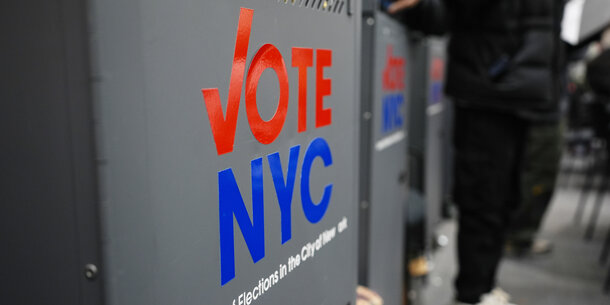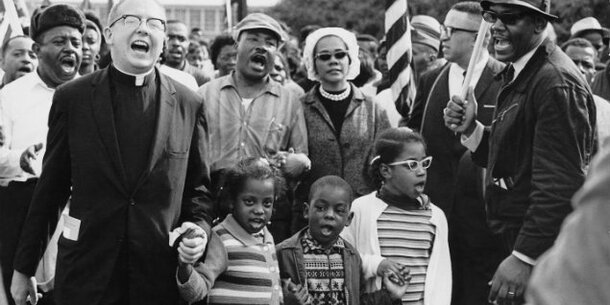In his first months in office, President Biden issued an executive order directing federal agencies to provide all eligible voters, regardless of political party, access to voter registration opportunities and reliable voting information.
He took that action on the anniversary of Bloody Sunday, a violent clash between civil rights activists and police in Selma, Alabama in March 1965 — a moment that spurred the passage of the transformative Voting Rights Act a few months later.
Below, the Brennan Center’s Lisa Danetz and Owen Bacskai discuss how the executive order helps voters in every corner of the country overcome barriers to the franchise, the steps federal agencies are taking to expand access, and the order’s historical significance.
What is President Biden’s voting access executive order and what are some actions taken by federal agencies to comply?
Danetz: Executive Order 14019 directs federal agencies to provide access to voter registration application opportunities and reliable voting information when eligible citizens are already interacting with the federal government. The order also aims to improve access in other ways, such as by requiring the government to examine obstacles to voting for people with disabilities and directing the General Services Administration to modernize vote.gov, a federal government website that provides accessible voting and registration information in multiple languages.
Bacskai: Federal agencies have taken a range of different steps to implement the order. Some — including two tribal colleges operated by the Department of Interior and several Department of Veterans Affairs health facilities — allowed states to designate them as voter registration agencies under the National Voter Registration Act of 1993. The Department of Defense is making the Federal Post Card Application — a form for military and oversees voters to register to vote and request absentee ballots — available in several non-English languages for citizens with limited English proficiency. And the Department of Agriculture’s Rural Housing Service pledged to provide nonpartisan voting information to rural housing residents through its borrowers and lenders. These are only a few examples.
Some state officials and lawmakers who oppose the executive order allege that the White House is “encroaching” on the responsibilities of states. How do you respond those criticisms?
Danetz: For more than half a century, Congress, under the Constitution’s Elections Clause, has passed legislation to regulate elections, improve access to voting, and allow or require federal agencies to facilitate voter registration. In the 1950s, President Eisenhower signed the Federal Voting Assistance Act, which engaged federal agencies in voter registration. That engagement evolved over decades with four additional laws that further involved federal agencies in voter registration. Notably, the National Voter Registration Act identified the “duty” of the federal government to promote the right to vote and empowered federal agencies to integrate voter registration opportunities into their services. Thirty years later, President Biden’s executive order is making that happen.
Critics of the executive order suggest that it is an effort to “help elect Democratic candidates including President Biden.” Is there any merit to this?
Danetz: This is a baseless assertion. Through implementation across a broad array of federal agencies, the executive order serves all Americans, regardless of political party. A variety of federal laws and regulations ensure that any voter registration activity is available to all and nonpartisan. The Hatch Act, for instance, prohibits federal staff from engaging in partisan political activity in the exercise of their jobs. The Justice Department’s Office of Special Counsel, tasked with enforcing that law, found that nonpartisan voter registration is permissible.
Bacskai: The executive order is well-rooted in long-standing federal law and policy, and it’s a firm outgrowth of the National Voter Registration Act. There are robust protections in place to ensure that it remains nonpartisan.
Why is it important for agencies to be involved in nonpartisan voter registration and providing voter information?
Danetz: The beauty of agency-based voter registration is that it is nonpartisan and reaches people in the regular course of their lives, no matter their background. For example, voters may see signs for vote.gov in a Social Security office or a national park and then access reliable information about registering to vote in their state.
What is the historical significance of the order?
Danetz: President Biden’s executive order is the most significant action by a president to ensure that the federal government helps provide access to voter registration and voting. While Congress has long sought to enlist the federal government in promoting free, fair, and accessible elections, no previous administration has taken on this challenge as fully.
When Congress passed the National Voter Registration Act, it instructed the federal government to play an active role in providing voter registration services. President Clinton issued an executive order directing federal agency involvement in voter registration under that law, but his directive went largely ignored. Under President Bush, only the Veterans Health Administration offered voting assistance to some facility residents. Both Presidents Obama and Trump extended Bush’s policy. Under Biden, the federal government will finally realize this long-standing yet unfinished federal policy.



